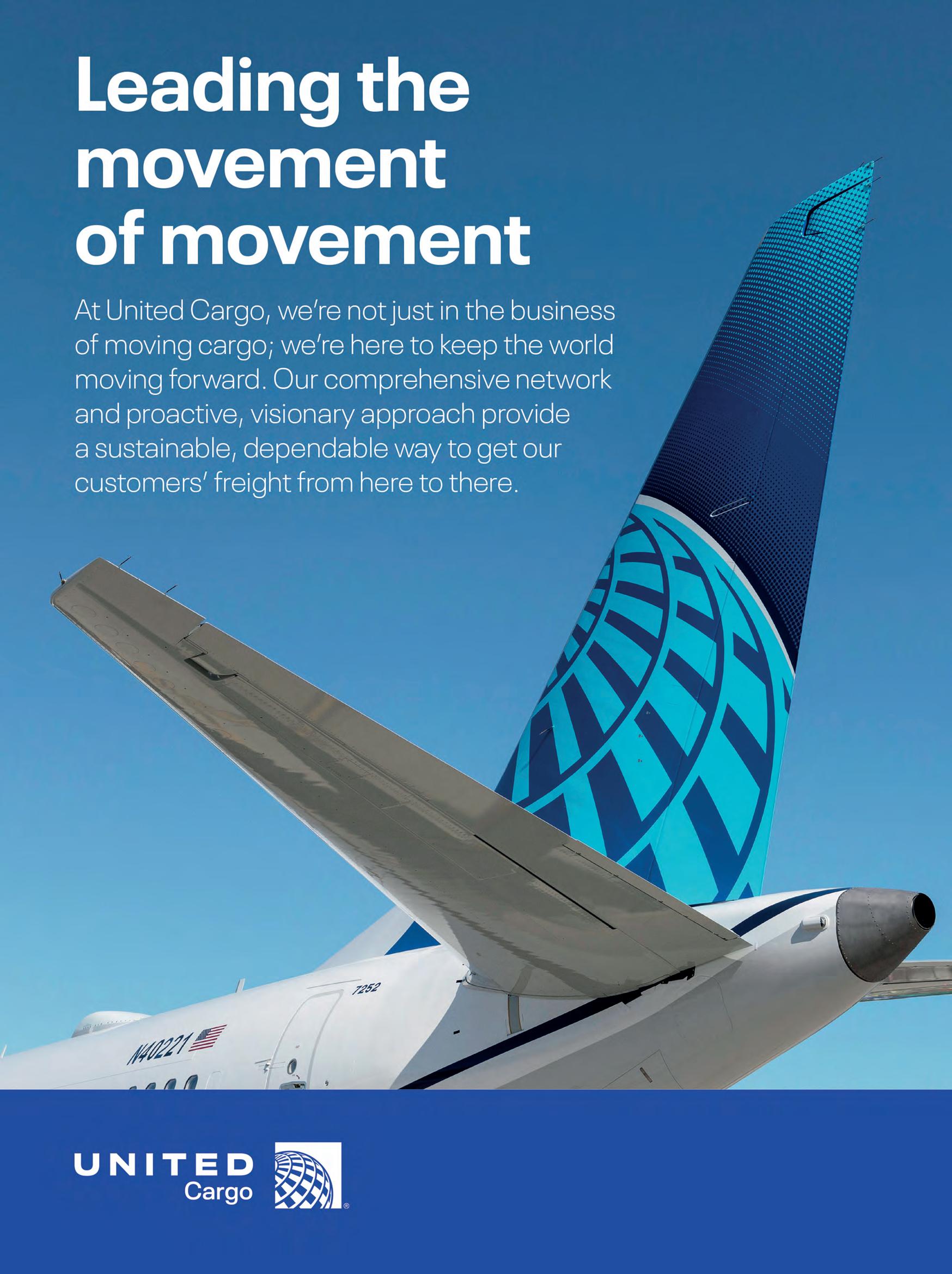
























The weekly newspaper for air cargo professionals


No. 1,239 17 July 2023
INSIDE
AIPUT COMPLETES AND LETS ...
AIPUT (Airport Industrial Property Unit Trust) has announced that it has let the newly completed ‘Black Arrow’ warehouse at ...




























No. 1,239 17 July 2023
AIPUT COMPLETES AND LETS ...
AIPUT (Airport Industrial Property Unit Trust) has announced that it has let the newly completed ‘Black Arrow’ warehouse at ...
Cathay Pacific continues to make progress towards achieving its goal of using Sustainable Aviation Fuel (SAF) for 10% of its total fuel use by 2030 by uplifting SAF onto its commercial flights for the very first time outside its Hong Kong hub. Blended and supplied by ExxonMobil Asia Pacific Pte Ltd, this batch of SAF was refuelled at Singapore Changi Airport onto four Cathay Pacific cargo flights – CX2076 to Hong Kong on 7th, 14th and 28th June, and CX2074 to Penang on 30th June. This follows the use of blended SAF uplifted at Hong Kong International Airport onto selected flights last year, and on the delivery flights for its new Airbus A350 from Europe over the past six years.
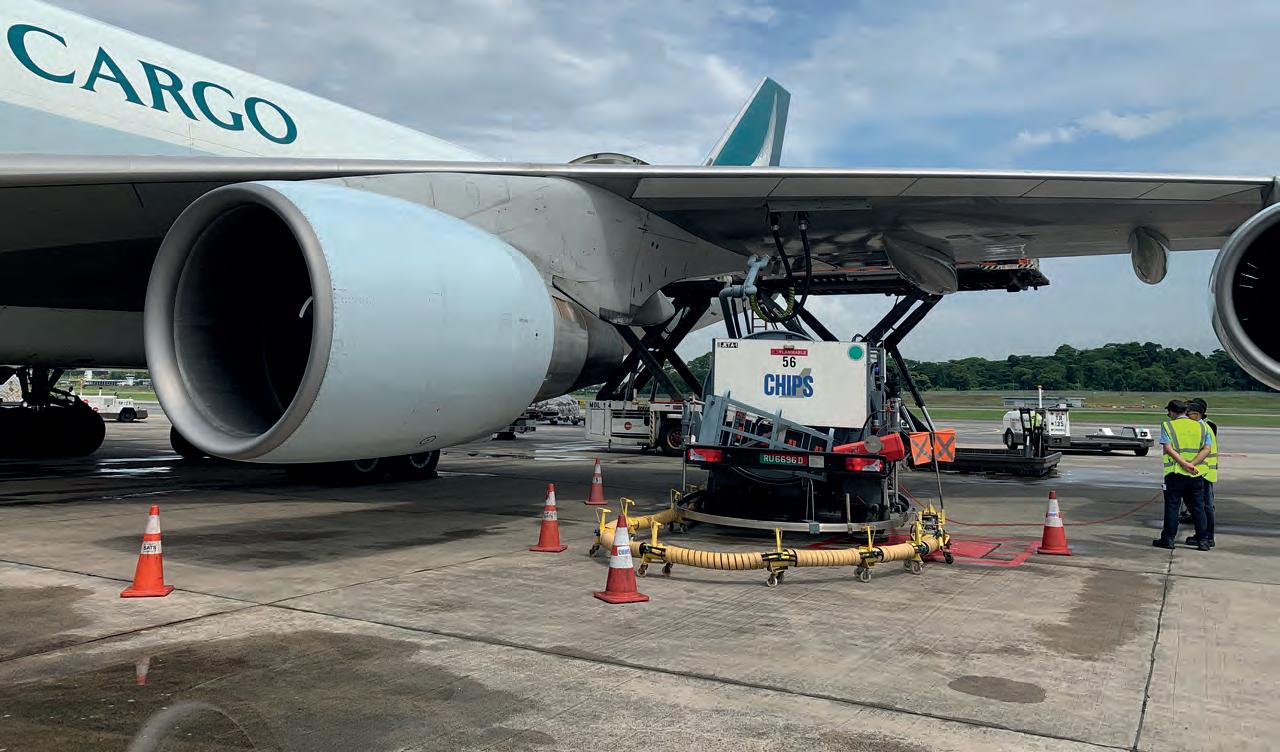
“This is an important milestone for Cathay Pacific and our ambition to achieve net-zero carbon emissions by 2050,” Cathay Group Chief Executive Officer Ronald Lam said.
“As an international airline, we have a leading role to play in helping the aviation industry to decarbonise and we are constantly exploring solutions and advocating for extensive collaboration with many stakeholders to combat climate change.
“We firmly believe that SAF will be the primary lever by which the aviation industry achieves netzero carbon emissions. By expanding the uplift of blended SAF onto selected commercial flights at Changi Airport, as well as our home hub, we hope to strengthen SAF awareness across the Asia Pacific

region and send a strong signal to the supply chain that there is firm demand for SAF from airlines.”
This neat SAF was created from 100% used cooking oil and meets International Sustainability and Carbon Certification (ISCC) EU standards. On a lifecycle basis, it can reduce GHG emissions by nearly 90% compared to conventional jet fuel, providing a lower GHG emissions air travel and air cargo solution.
“ExxonMobil remains focused on growing our lower GHG emission fuels business to support the decarbonisation goals of the aviation industry, leveraging our operational and logistical capabilities,” Ong Shwu Hoon, Asia Pacific Fuels Vice President, ExxonMobil Asia Pacific Pte Ltd, said.
ROBOTS STRENGTHEN HACTL ...

HONG Kong Air Cargo Terminals Limited (Hactl) is beefing up site security at its SuperTerminal 1 facility, with the introduction of ...
KEEPING PERISHABLE GOODS ...
AMERICAN Airlines Cargo plays a vital role in handling perishable goods in the Latin American region, particularly in Argentina and Brazil ...

PAGE 6
WEBCARGO LAUNCHES AIRLINE ...
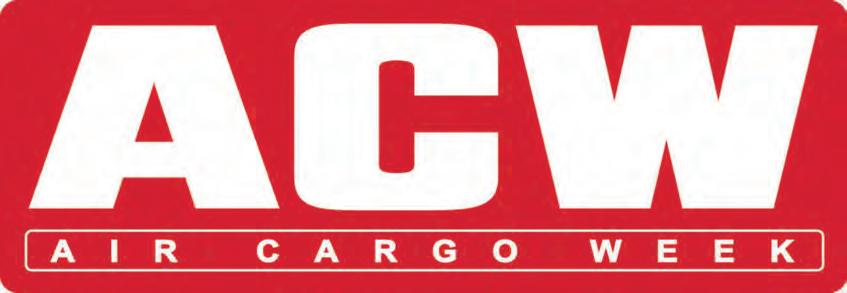
WEBCARGO by Freightos has announced that its new Airline Dashboard has emerged from beta for its 35+ airline partners. With the new product, airline ...

PAGE 7
Page 10
AIPUT (Airport Industrial Property Unit Trust) has announced that it has let the newly completed ‘Black Arrow’ warehouse at its Blackthorne Point logistics campus, part of the Poyle Trading Estate to the west of Heathrow’s Terminal 5 (T5). The site is the first UK logistics base for international freight forwarder, EFL Global, who are in growth mode. This transaction reinforces the health of the occupier market and the strong international appetite for highquality modern warehouse space around Heathrow and West London.
The new warehouse building will be operationally net zero and incorporates a range of environmental initiatives including roof-mounted photovoltaic panels and other Low and Zero Carbon technologies, which together will deliver a 30% reduction in CO₂ emissions over building regulation requirements. Black Arrow is projected to achieve a minimum of BREEAM ‘Excellent’ and EPC ‘A+’ ratings and has been constructed in accordance with AIPUT’s Pathway
to Net Zero strategy, which seeks to decarbonise the fund’s operations and its logistics portfolio by 2040.
The new high-specification, 27,760 sq ft GIA (2,579 sq m GIA) industrial warehouse occupies a 1.2 acre site adjacent to AIPUT’s Blackthorne Point Estate, close to T5 and within a mile of Junction 14 on the M25. Once fully operational, up to 35 new roles are expected to be created at the site, which will primarily handle stock imports for major high street clothing retailers. “AIPUT is delighted to welcome EFL Global as our newest customer to our recently completed Black Arrow warehouse, West Heathrow. Collaboration is at the core of our culture, and through working closely and at speed with EFL Global, we are pleased to have met their needs and introduce an exciting new global freight forwarder to the UK logistics market,” AIPUT Fund Manager Nick Smith said.

Editor: Edward Hardy
Supplement Editor: James Graham
Associate Editor: Chris Lewis
Contributors: David Craik, Stuart Flitton, Neil Madden, Donald Urquhart
Director of Operations: Kim Smith
International Sales Director: Rosa Bellanca
International Sales Executive: Zainab Khalid
Finance Manager: Rachel Burns
Design & Production Manager: Alex Brown
Production Supervisor: Kevin Dennis
Website Consultant: Tim Brocklehurst Directors: Norman Bamford • Dawn Jolley
HONG Kong International Airport has celebrated its 25th Anniversary today. Chairman, Board Members and Chief Executive Officer of Airport Authority Hong Kong (AAHK), together with the airport community, passengers and members of the public took part in the kick-off event of the celebrations at the Arrivals Hall in Terminal 1.
A series of celebratory performances was unveiled by the drums, followed by a jazz band and dance performances by airport staff from AAHK, home-based airlines and other airport companies. A youth orchestra and a local pop singer also joined

the shows.
A cake-cutting ceremony was officiated by Jack So, Chairman of AAHK; Fred Lam, Chief Executive Officer of AAHK; Liu Chunsan, Acting Secretary for Transport and Logistics; AAHK’s Board Members and Executive Directors; and representatives from the home-based carriers.
Hong Kong International Airport was moved from Kai Tak to Chek Lap Kok on 6 July 1998. To celebrate this special day, three rounds of the music and dance performances were staged in the terminal.
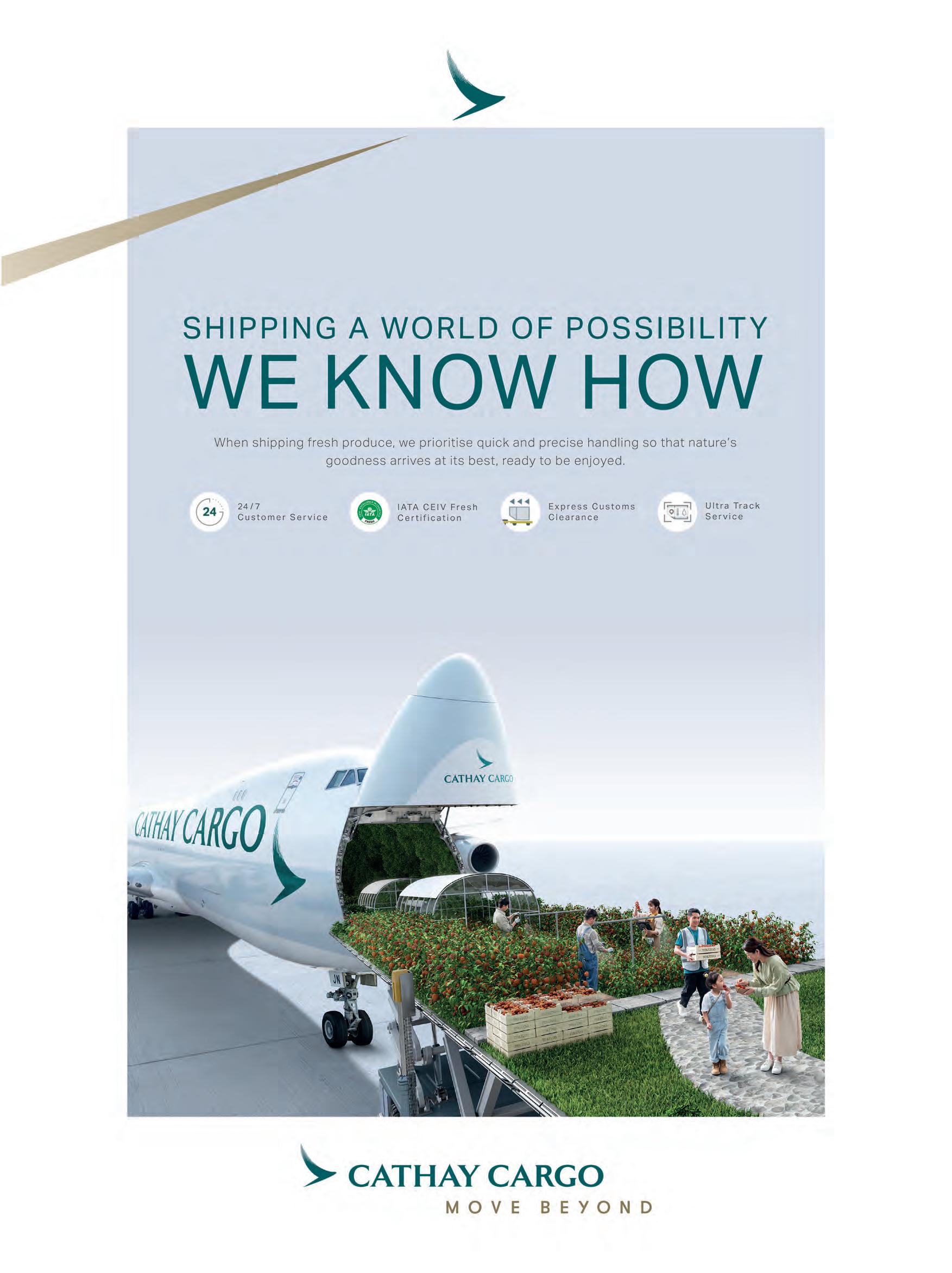
HONG Kong Air Cargo Terminals Limited (Hactl) is beefing up site security at its SuperTerminal 1 facility, with the introduction of robot patrols.
The first security robot is about to enter service, initially patrolling car and truck parking areas, and export goods handling areas, mainly during the peak night-time period; but the robot will also be deployed during daylight hours as required.

In addition to stepping up anti-theft measures and reinforcing awareness of Hactl’s rigid security programme, the new security robots will also monitor the condition of cargo throughout the company’s giant site, and will record any incidents of damage, to provide video evidence in the event of claims investigations.
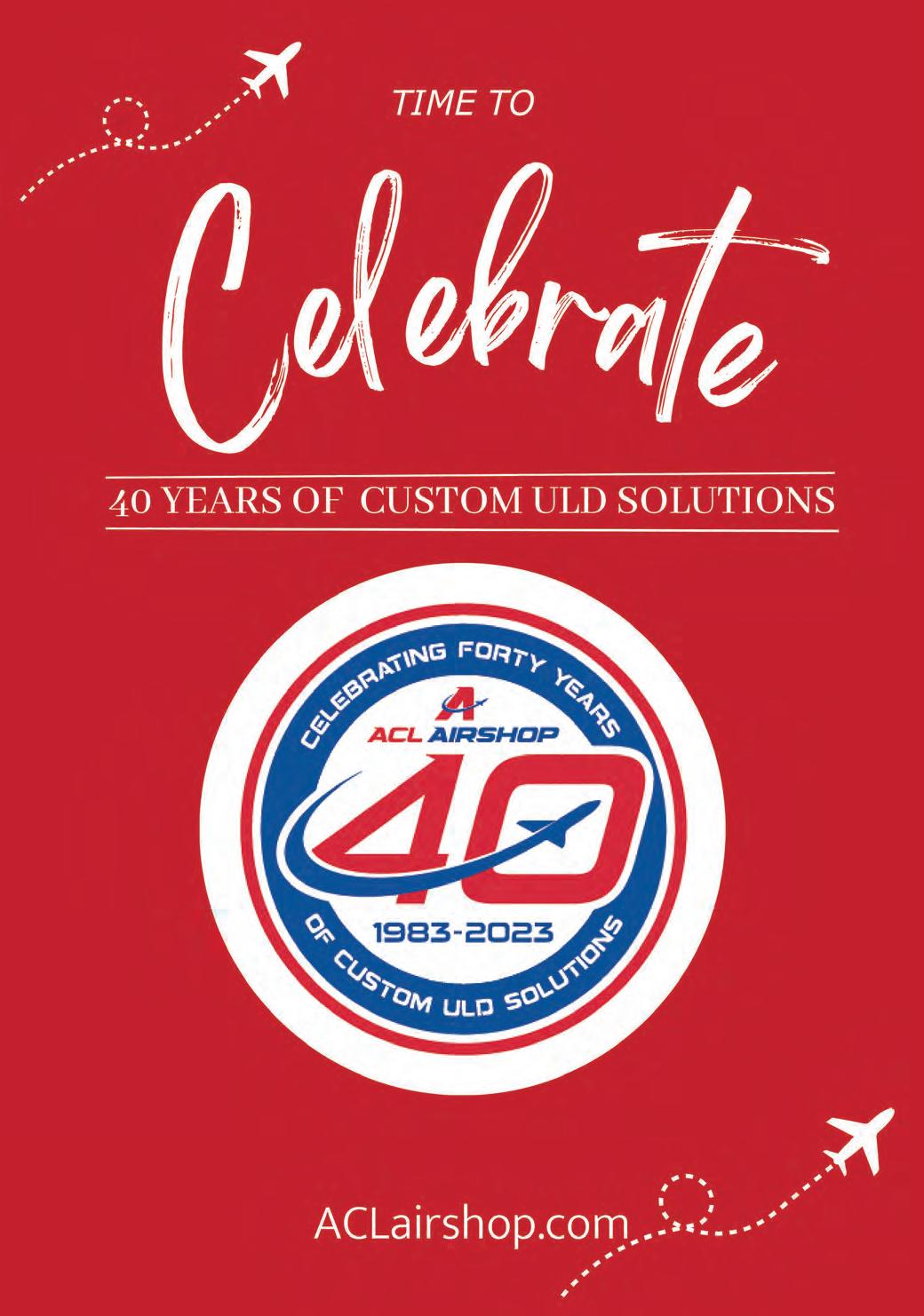
The robot features a thermal imaging camera, a high-resolution camera with a wiper for outdoor use, a LiDar technology sensor for navigation and multiple ultrasonic sensors for
collision avoidance. It can operate on any paved surface.
“The security robots will complement our existing CCTV system, providing footage from more angles to assist in security and cargo claims evaluation. Their presence will also send a clear message that Hactl is maintaining thorough observation of all its operational areas around the clock,” Wilson Kwong, Chief Executive of Hactl, said. “This is a significant step forward in strengthening our overall security programme.” This is the third area of Hactl’s business which has seen the introduction of robotics. During the pandemic, Hactl introduced sanitisation robots to help reduce the risk of infection among its workforce, and more recently launched a robotic Automated Parts Store to dispense urgent spare parts which are needed around the clock to maintain its massive automated handling systems.
MERLIN, the aviation technology company developing the world’s most capable pilot to advance the future of automated flight, has announced it successfully completed 25 test flights in Alaska following a USD $1 million contract with the Federal Aviation Administration (FAA) to demonstrate a highlyautomated flight control system in conjunction with a safety pilot. In partnership with the FAA-designated University of Alaska Fairbanks UAS Test Site and Everts Air Cargo, the test flights reached rural areas using crewed aircraft augmented with its integrated hardware and software solution, the Merlin Pilot. All routes originated from Fairbanks and flew to Fort Yukon, Galena, Huslia, Tanana and Prudhoe Bay. Over sixty hours of systems-on, autonomous flight time were successfully completed with the Merlin Pilot allowing for extensive data collection in a real world environment with complex terrain and inclement weather. This data is essential to maturing Merlin’s in-flight capabilities as well as progressing autonomy for the aviation industry, making skies safer and more accessible for the future.

“Operating in Alaska is a real challenge. I like to say we’re the final exam. If you can fly here you can fly anywhere as we deal with long distances, extreme climate variations, and limited communications coverage,” said Dr. Cathy Cahill, Director of the Alaska Center for Unmanned Aircraft Systems Integration (ACUASI) at the UAF Geophysical Institute. “As we’ve learned in collaboration with Merlin’s team, it’s very apparent that they are doing this right. Their integrated approach to our unique ecosystem is one of the main reasons they were the first company with which we approached the FAA. They use real data to train the onboard automation system to ensure safety.”
“The data we’ve been able to gather from these flight trials is critical to the maturation of our in-flight technology, but also to our continued progression in certifying the Merlin Pilot,” said Matthew George, co-founder and CEO of Merlin. “It’s exciting to know our technology can successfully reach remote locations in Alaska, proving an important application for autonomy; its ability to assist in dangerous missions. We’re incredibly thankful for the support and partnership of the FAA, Everts Air Cargo, and ACUASI.”

AMERICAN Airlines Cargo plays a vital role in handling perishable goods in the Latin American region, particularly in Argentina and Brazil where their widebody service is heavily deployed. These lanes support cargo transportation to the United States and beyond, and perishable goods are among the top commodities originating from these regions.

“Our customers are looking for consistent capacity and reliable service, and this is what we can provide year-round regardless of the challenges of seasonality,” Lorena Sandoval, American Airlines Cargo’s Sales Director – Florida, Mexico, Caribbean and Latin America, said.
decrease,” Sandoval explained.
The year-round flower market in the Latin American region has been strong despite some challenges. American Airlines Cargo’s key routes for the transportation of flowers include Miami and London, with small volumes also being sent to Tokyo Narita.
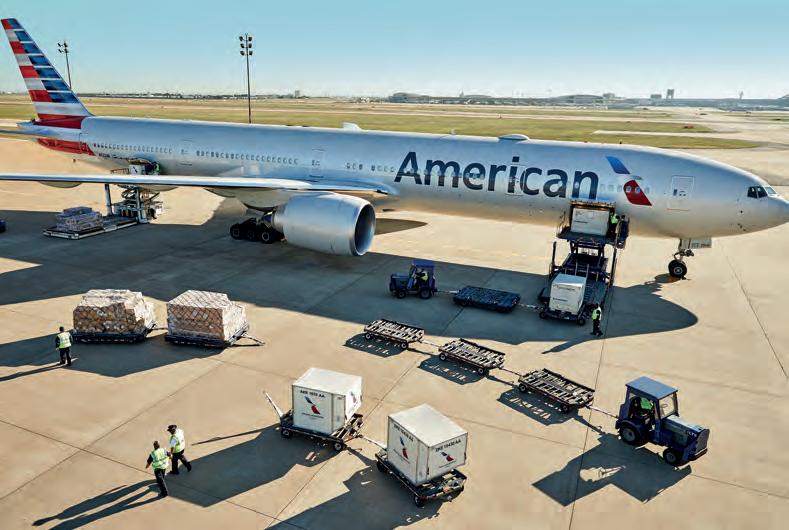
“MIA is the main hub for cargo from Latin America. From here, end customers with countrywide distribution needs can consolidate multiple types of commodities from multiple origins to distribute easily to anywhere within the U.S.,” Sandoval stated.
Several major hubs in the Latin American region play a crucial role in airfreight operations. Buenos Aires and Santiago are important markets where American Airlines Cargo moves large volumes of salmon throughout the year. In Buenos Aires, they also transport perishables and some general cargo to Miami, Dallas and New york.
During the season, American Airlines Cargo transport berries to Israel. Out of Santiago, their flights have strong load factors year-round, especially to Miami.
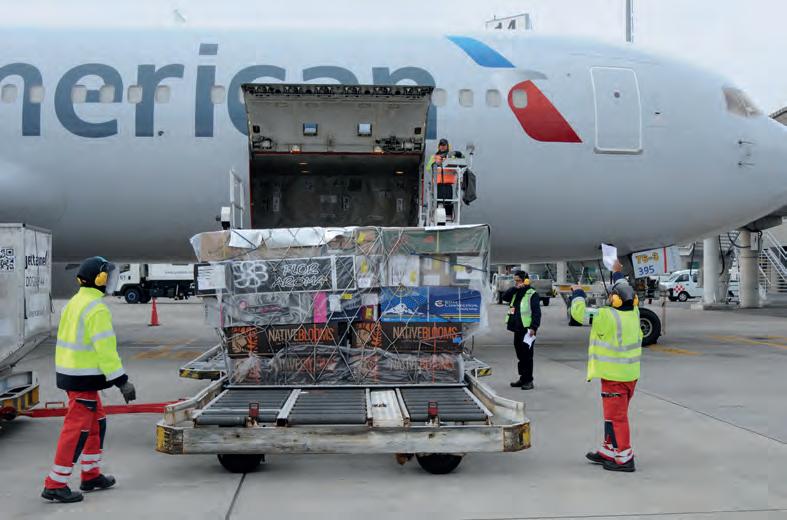
Another significant market is Sao Paulo, where they handle general cargo business to multiple destinations and transport fresh fish to Miami and New York.
In the Latin American airfreight market, widebody services are crucial for the transportation of goods. Due to the diverse commodities and volumes originating from the region, a significant percentage of exports are carried by freighters.
During the pandemic, the number of freighters flying to the region experienced a growth of approximately 20%. This increased capacity, combined with the return of multiple passenger airlines, resulted in overcapacity and decreased rates. Additionally, economic situations, exchange rates, and inflation pose additional challenges in the market.
“These markets are served with widebody aeroplanes which allows us to play an important role for both shippers and forwarders with consistent capacity during the year. Our daily departures and a recognised on-time performance are what our customers appreciate most,” Sandoval highlighted. “We feel confident in the service we provide for our customers and will continue to see what we can do to we can meet their needs even more. Overall, competition is a good thing for innovation and creativity across the industry.”
The main types of perishable goods that American Airlines Cargo moves between the Latin American region and major hubs include flowers, salmon, tilapia, fresh fish, seeds, and fruits such as cherries and berries. Demand for these goods fluctuates throughout the year due to various factors. Special occasions like Valentine’s Day, Mother’s Day, Women’s Day, and All Saints’ Day significantly increase the volume of flower shipments. Conversely, perishable products, such as salmon, are price-sensitive, and when the volume of salmon exports from Europe to the United States increases, it impacts the volumes of the same product in other parts of the world.
“As long as people want fresh fruits and fish on their table, our opportunities here remain. The same goes for flowers, as they continue to be a globally recognised way to express love and appreciation to those close to us,” Sandoval added.
The difference in seasonality between the Northern and Southern hemispheres allows American Airlines Cargo to provide different markets with fruits when there is a change in production in the opposite hemisphere. For example, they can transport cherries and berries to the United States during their wintertime.
“It is exciting to be a part of this flow of perishable traffic and seeing first-hand how air cargo plays a role in keeping everyday goods like these moving year-round, Sandoval said.
Specific countries in the Latin American region are known for their cargo activities involving these perishable goods. Argentina is recognised for seeds, Chile for salmon, and Colombia and Ecuador for flowers.
“For the most part, we expect trends to be around the same 2022 levels, though there were some climate challenges that impacted farms in Argentina and seed exports are experiencing a
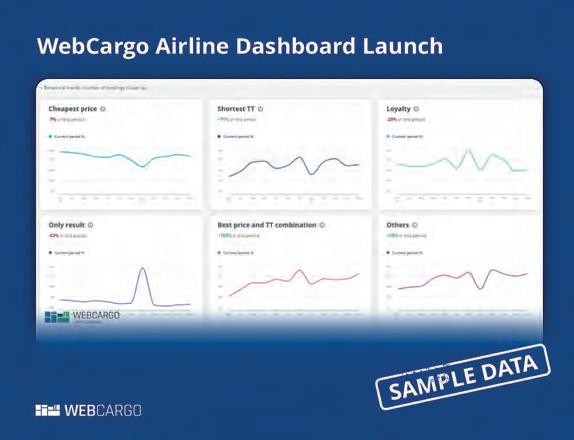
WEBCARGO by Freightos has announced that its new Airline Dashboard has emerged from beta for its 35+ airline partners. With the new product, airlines can optimise revenue and utilisation with unparalleled visibility into customer behaviour across over 10,000 forwarding offices, while gaining the ability to easily adjust surcharges, services and more.
WebCargo’s Airline Dashboard gives airlines a competitive edge with nearly real-time data generated by analyzing tens of thousands of monthly eBookings. The dashboard provides general industry data, as well as granular airline-specific lanelevel insights, including sophisticated market data on the customer price sensitivity, how soon before departure the majority of customers book or cancel freight, data on origins and destinations, and other market trends.
“WebCargo’s Airline Dashboard will transform airlines’ ability to optimize pricing and balance yield and volume. Many airlines have been in the dark when it comes to broader industry behavior. Our Dashboard fixes this while helping them analyse
SWISS WorldCargo has announced that its new commodityfocused, modular airfreight service structure is now live, offering a range of tailored solutions that cater to our customers’ unique needs. For the past few days, Swiss WorldCargo’s new product structure has been in full swing, giving its customers more flexibility when it comes to selecting the shipping service that best matches their cargo’s needs.

“From high-value goods to temperature-sensitive shipments, and everything in between, we handle every commodity with expert care and precision. At Swiss WorldCargo, we extend the same level of quality and dedication to all types of shipments, ensuring excellence across our entire product pallet. I’m very excited about our new offer structure, as I believe that it will bring added value to our customers thanks to the enhanced customization opportunities that come with it” said Lorenzo Stoll, Head of Cargo at Swiss International Air Lines.

It is our commitment to ensure the highest quality for a seamless and secure journey of our customers’ shipments, giving them peace of mind throughout the entire transportation process. Thanks to the new modular product structure, the customers can now choose one of the branded products and easily combine it with one or more of the transportation solutions and addon services to facilitate their shipment; this modular structure enables them to customize their air cargo service to align it with their requirements perfectly.
Thanks to the new product structure, customers can now choose from temperature-controlled options, expedited speed choices, or specialised handling for dangerous goods. The flexible offerings cater to their specific needs, enhancing their shipping experience. The customers can also take advantage of add-on services, like the “Green Choice” option for more sustainable practices, real-time visibility through active tracking devices, or the convenience of home delivery service, directly to the customers’ warehouse.
why customers are clicking on certain offers and passing on others. Visibility into customer behaviour is invaluable for airlines’ pricing and revenue teams, especially when combined with tools to adjust their cargo offers to meet those needs and make the sale,” Manel Galindo, CEO of WebCargo, said.
“The dashboard is an amazing tool not only to understand performance but also to adjust pricing strategy in real time,” Andrés Romero, Head of Revenue Management for American Airlines Cargo, said. “Leveraging the data from the dashboard, we have been able to attract more revenue and adapt more quickly to market changes.”
“With WebCargo’s Airline Dashboard, the new data that becomes available through digital sales gives us the ability to steer, navigate and test in new ways,” Toke Høgild, Head of Commercial at Scandinavian Airlines’ SAS Cargo Group, an early adopter of the Dashboard, shared.
It’s not enough to be in the right place at the right time. You have to be with the right GSSA in the right place at the right time. Let’s check in with Miami-based PrimeAir, Latin America’s premiere General Sales and Service Agent that’s been serving the region for over 22 years.
Currently, there’s a glut in air cargo capacity as airlines across the world that ordered new freighters during the pandemic are now struggling to fill them. All the while passenger carriers, responding to the strong recovery in travel, are deploying even more aircraft – and more belly-hold capacity.
Despite this, it’s the right time to be in Latin America as air trade here is growing with demand for fresh perishable goods around the globe.
The Latin American air freight industry is expected to grow from USD 1.00 billion in 2023 to USD 1.23 billion by 2028, at a CAGR of 4.22 percent during the forecast period (20232028), according to the International Air Transport Association (IATA). In fact, Latin American carriers outperformed all other worldwide regions in May, in defiance of the general declining trend with a rise in cargo volumes of 13.8 percent.
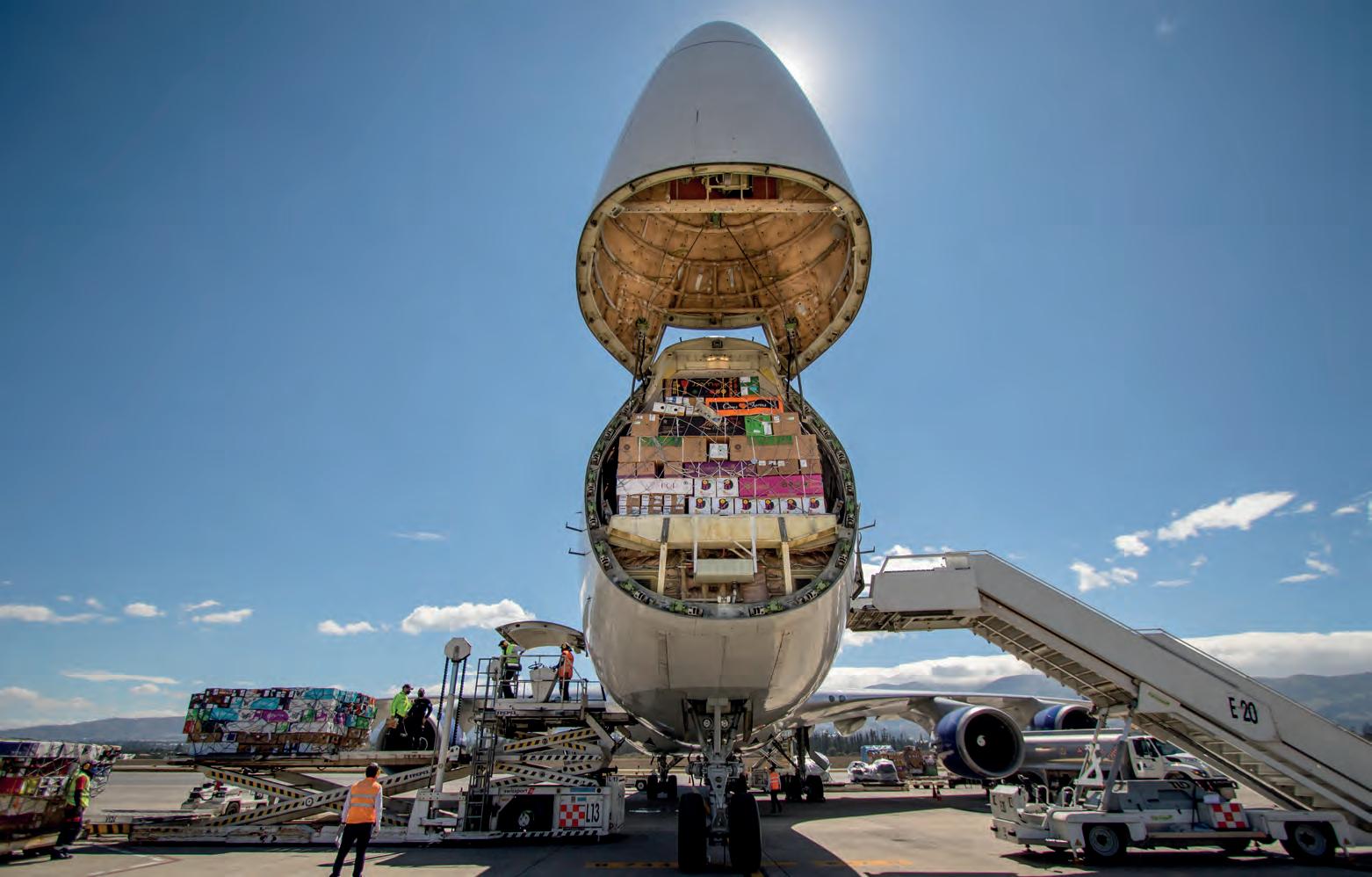
“Air cargo companies looking for the right place to deploy new service are finding Latin America highly desirable, especially considering the sizable year-round production of produce, fresh-cut flowers, and fish throughout the region,” says Roger Paredes, CEO of Prime Group.

“As a trusted GSSA in the Americas for over two decades, we’ve gained a reputation for sustained reliability and high-quality service to our air carrier customers, including some of the most reputable names in global air cargo transport” adds Paredes. “This is precisely why PrimeAir is the go-to GSSA in Latin America.”
Providing a global service combined with extensive local knowledge, PrimeAir customizes regional front-line services for airlines and other enterprises from across the globe. They specialize in commercializing air freight capacity, supervising complex local operations, and providing professional sales and marketing support.
PrimeAir’s Miami headquarters – located in the “Gateway to Latin America”
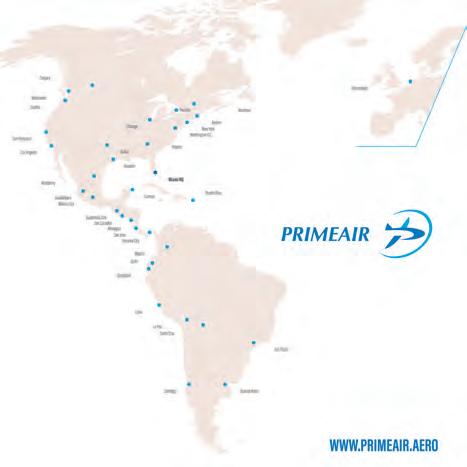
– is the perfect point of contact for airlines from all across the world – while the company’s hub stations in Ecuador and Colombia closely supervise the action on the ground throughout the region.
PrimeAir’s specialty skills also include international certifications for reception and dispatch of aircraft, airport and cargo security management, and a thorough knowledge of international customs and trade rules. Be it in service to an ad hoc or long-term agreement, PrimeAir’s broad spectrum of GSSA services also includes:
• Air Cargo Charters
• Warehouse Management
• Cold Storage & ULD Control
• Ramp Supervision & Ground Handling
• Data Analysis & Online BI Reporting
• Revenue Accounting & Yield Management

• Management Reports
• Representation at Industry Events
• Direct Mailings & Market Analysis
• Customer Service
PrimeAir’s local-market proficiencies also extend to the U.S. Stepping back to 2022, when a prominent Latin America-based cargo carrier wanted to enter the lucrative North American market, they knew they needed an established GSSA to help them feed new traffic between the U.S. and their South and Central American network. PrimeAir accepted the challenge to represent their service, increase cargo volumes, and optimize operational efficiency. And business is taking off.
Today, all the extra cargo capacity compared to demand is putting downward pressure on rates worldwide, making this a good time for Latin American shippers and forwarders to double down on air freight – and a good time for air carriers to set up shop with a GSSA that knows the terrain, PrimeAir.

Establishing itself as a leader in South America in the flower transportation industry, LATAM Cargo recently announced the arrival of their 18th dedicated cargo aircraft. The acquisition of the Boeing 767-300BCF is a significant milestone for LATAM Cargo, as the model is ideal for their target destinations, enabling the company to expand its network and explore new routes.
With the addition of the new cargo aircraft, LATAM Cargo increases capacity for the floriculture sector by 20%. This boost ensures the smooth transportation of delicate and perishable flowers, maintaining their freshness and quality throughout the journey.
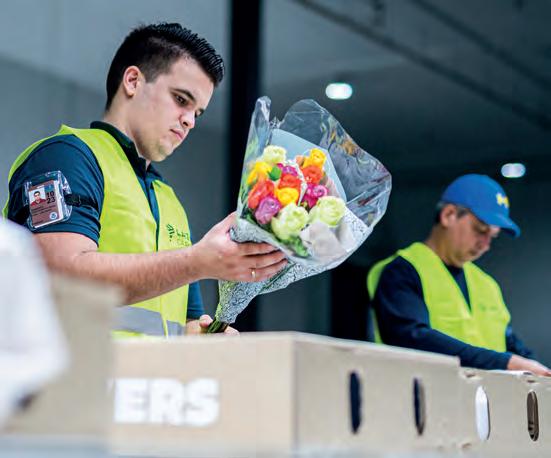
In line with this, two of the markets in which the LATAM Cargo Group will use this new capacity are the flower export markets of Colombia and Ecuador. With the incorporation of this new cargo aircraft, the group has been able to add seven new frequencies departing from Quito, Bogota, and Medellin, thus increasing the capacity offered to customers of the floriculture sector by 20%.
LATAM Cargo has experienced remarkable growth in Medellin and Bogota, with operations tripling from 12 weekly flights in 2019 to an impressive 35 flights in 2023. The company’s presence in Ecuador has also expanded by 131% since 2019, with weekly departures from Quito set to increase to nearly 30 this year.
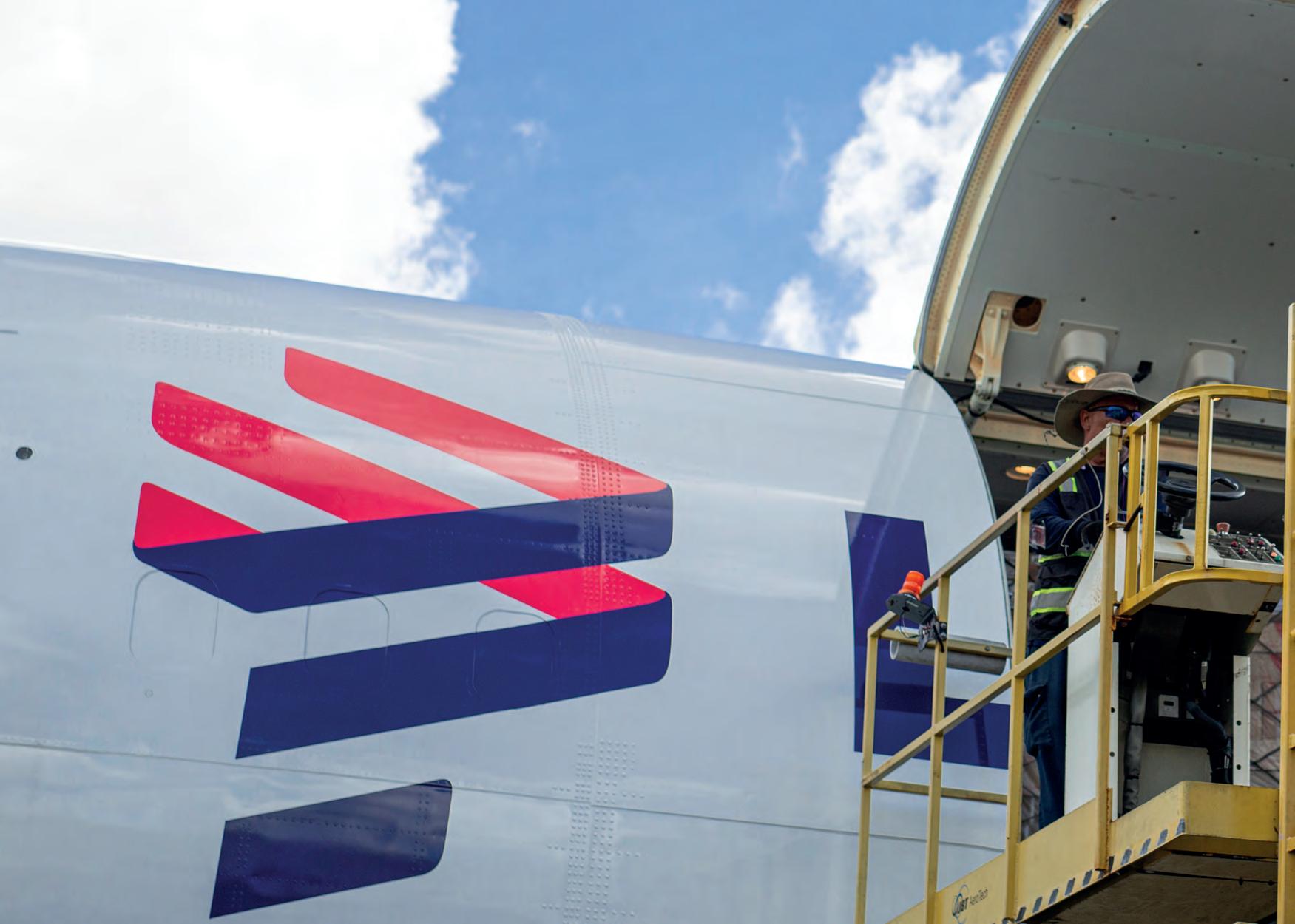
Through their customer-centric approach, commitment to meeting evolving needs, and investment in fleet expansion, LATAM Cargo is well-positioned to continue providing innovative solutions and exceptional service to their valued customers.
“We are constantly looking for ways to offer better alternatives to our customers, so we deploy the capacity where we see that we can generate value for them. We strive to be the top choice for flower transportation from South America to the United States and Europe, offering the best in terms of capacity, destination diversity, customer service, and understanding the real needs of our clients. Working closely with them, we aim to address their requirements and seek collaborative solutions.”, said Claudio Torres, Commercial VP South America at LATAM Cargo
The company’s commitment to supporting the floriculture sector reflects their dedication to meeting evolving customer needs.
“This aircraft has the perfect size for the markets where we operate and the arrival of them, allowed us to increase our network, so we can give our customers more and better alternatives for their freight,” Claudio Torres, Commercial VP South America at LATAM Cargo, said.
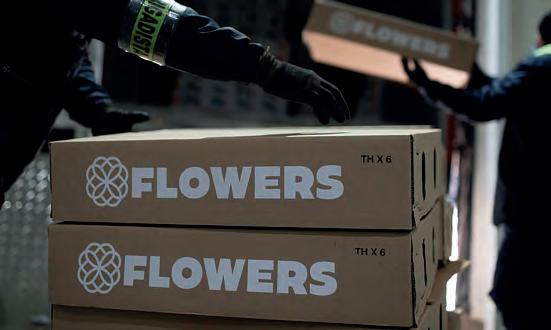
“With the addition of the new cargo aircraft, LATAM Cargo increases capacity for the floriculture sector by 20%”
“We see a market that continues to grow, with healthy and established clients. The new cargo aircraft will allow us to expand our presence in the export and import markets in the region, while also supporting our floriculture sector clients and providing them with increased capacity for transporting this delicate and important product.”, explains.

The company offers high-capacity transportation year-round to North America, Europe, and South America, specializing in the handling of temperature-sensitive products, like flowers. “We provide our clients with a high capacity towards North America, Europe, and South America consistently throughout the year, while we support them in the growth of their volumes, including peak flower seasons such as Valentine’s Day, Women’s Day, Mother’s Day, and more”, he added. “All of this is combined with proper flower handling, as it is a highly temperature-sensitive product susceptible to cold chain disruptions”.
The new Boeing 767-300BCF will primarily operate in the US-Latin America region, strengthening existing capacity and facilitating the
opening of new routes in Brazil and the Caribbean. By strategically deploying this aircraft, LATAM Cargo aims to meet growing demand in these markets, also offering efficient transportation solutions to flower exporters and other industries.
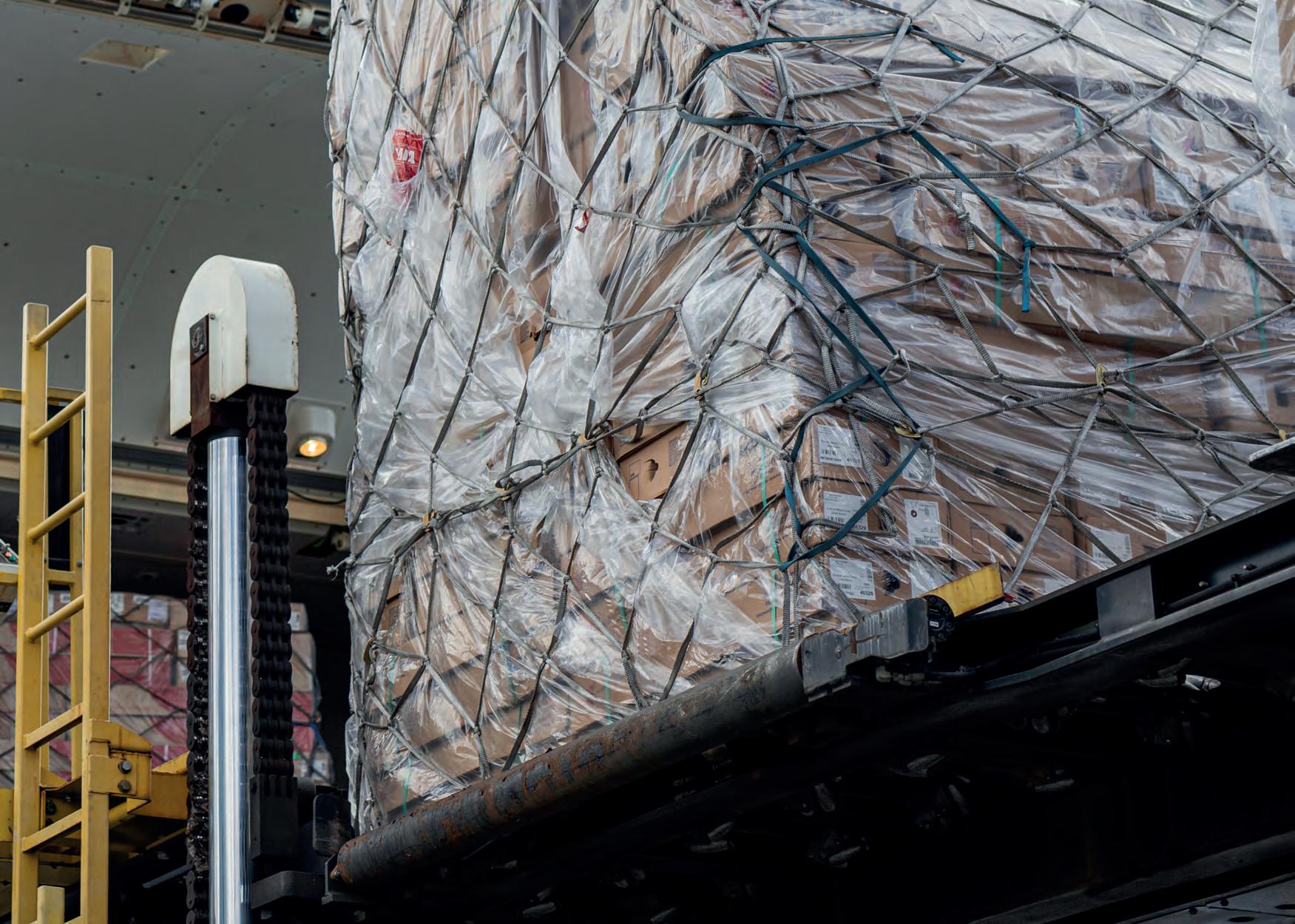
The new aircraft allows LATAM Cargo Group to offer customers a wider range of options and superior freight services, further solidifying the company’s position as a trusted partner in the industry.
In addition the arrival of the new aircraft strengthens their network of destinations from its Miami hub. This expansion enables the company to provide customers with increased access to a greater number of destinations in Latin America, further enhancing their value proposition.
In this matter, LATAM Cargo has also introduced a new route from Europe to Miami, enabling European customers to seamlessly connect to various destinations across South and Central America.
“Now, with the arrivals of the BCF as part of our strategic plan, we increased flights and also added a new route from Europe to Miami, so our European customers can connect via Miami to all the South and Central America destinations we serve directly.” Torres explained.
“We are constantly looking for ways to offer better alternatives to our customers, so we deploy the capacity where we can generate value for them”
